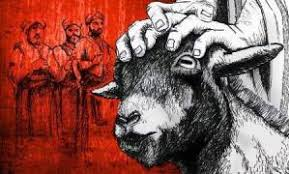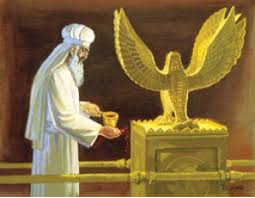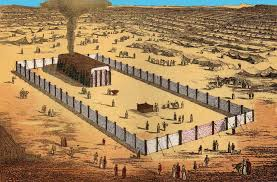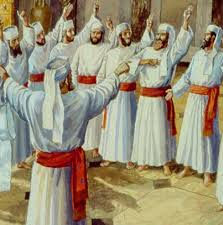Bz – Servants of Satan 11:7-15 and 20
Servants of Satan
11:7-15 and 20
Servants of Satan DIG: Why do you think Paul refused support from the Corinthians but accepted it from the Macedonian churches? How was Paul’s servant-attitude distorted by the false prophets? Why was Paul’s anxiety for the church a proof of his love for them? How do their motives compare to his? What is Paul’s conclusion about the false prophets?
REFLECT: What comes to mind when you hear the word “Satan?” Why doesn’t he appear with his pitchfork, horns and pointed tail image as mankind’s archenemy? When in your life have you experienced that Satan and his servants are real? What is your criteria when you give to different ministries? How can you tell if someone is in ministry just for the money?
For Satan himself masquerades as an angel of light;
so it’s not surprising that his demons masquerade as servants of righteousness.
Having asserted that he was not inferior to the false prophets, Paul takes up a new and unrelated topic: his refusal to accept the financial support from the Corinthians church that would have allowed him to exercise his ministry without working even though the apostle knew that he was permitted financial support (see the commentary on First Corinthians, to see link click Bo – Laying Aside Rights). The Corinthians must have thought that Paul didn’t love them. The false prophets, who accepted payment, probably wanted the apostle to do likewise, since that would have put them on the same footing as him. Nonetheless, although under pressure to reverse his policy, Paul refused to do so.242
The true servant of God (11:7-12): Paul began with a rhetorical question: Did I sin in humbling myself so that you could be exalted, in proclaiming God’s Good News to you free of charge (11:7)? It was Paul’s policy not to accept financial support from churches in which he was currently ministering. But from the Corinthians’ point of view, Paul had painfully breached social norms in rejecting their support which were usually given to those who taught and lectured in the Greco-Roman culture of the day. It is probably, however, that “sin” was Paul’s word rather than theirs, reflecting his deep pain in response to their criticism.243
His words dripping with irony, Paul acknowledged that he accepted financial support from other churches in order to minister to the Corinthians. Yes, he said: I “robbed” the other congregations of Macedonia by accepting support from them in order to serve you. Paul had plied his trade as a tentmaker while in Corinth (Acts 18:3). However, either business became slow or the demands of his ministry curtailed the amount of time he had to work. In either case, Paul was for a time in a terrible financial situation, lacking the basic necessities of life. Yet even then, when he had needs, he did not burden anyone. Eventually, Silas and Timothy providentially arrived with the support from the churches in Macedonia, allowing him to devote himself to full-time ministry (Acts 18:5). Just as Paul had kept himself from being a burden to the Corinthians in the past, he would continue to do so on his planned upcoming visit (11:8-9). Unlike the proud, lying false prophets, who would not dream of lowering themselves to do manual labor, Paul humbled himself to the place of a common worker. True servants of God are free from the love of money (First Timothy 3:3) and seek nothing but the opportunity to faithfully carry out their ministry.244 Paul said: The truthfulness of the Messiah is in me, so that this boast concerning me is not going to be silenced anywhere in Achaia (11:10).
The Corinthians undoubtedly interpreted Paul’s refusal of their support as an indication that he didn’t love them, or at least, loved them less, because he had accepted the support of other churches. Why won’t I ever accept your support? Is it that I don’t love you? God knows I do (11:11)! Therefore, Paul needed to affirm his love for them, and in 12:13 he asked in what way were they any worse off than any of the other churches except that I myself did not burden you financially, and concluded with a dose of irony: Forgive me this injustice! It seems likely that there was a group of wealthy Corinthians who offered Paul a gift of financial support that he refused, but the false prophets accepted (see Af – The Problem of the False Prophets). No, I do it – and will go on doing it – in order to cut the ground from under those who want an excuse to boast that they work the same way we do (11:12). Understanding this, it then becomes easier to understand the point of contention between Paul and the congregation at Corinth. In their minds, the wealthy Corinthians had made him an offer of “friendship.” By refusing it, Paul offended them, raising doubts about his love for them and the church. That opened the window of opportunity for the false prophets to call into question Paul’s apostleship and compare him unfavorably to themselves.
As for Paul, he probably refused this offer, not because he loved them less than his other converts, but because he understood all too well that such “friendship” would have made him indebted to certain wealthy Corinthians. Since Paul was the apostolic father of the church, whose duty was to provide for his children (12:14), he couldn’t tolerate any arrangement in which his allegiance to God would be compromised.245
The servants of Satan (13-15 and 20): Throughout his letter, Paul had alluded to the false teacher, who claimed apostolic authority in Corinth, referring to them indirectly as the many who were guilty of peddling the Word of God (2:17); as some who regard us as living in a worldly way (10:2b); as those other men who tell you how important they are (10:12a NLT); and as those who preach another Yeshua and a different Gospel (11:4). But now the time had come to bluntly and directly expose them.
The fact is that such men are deceitful workers and false prophets (11:13a). Paul called them exactly what they were. The name false prophets (Greek: pseudo apostoloi) appears only here in the B’rit Chadashah. Some think that Paul coined this word after the analogy of false Messiah’s and false prophets (Mark 13:22), and false brethren (Greek: pseudadelphous) in Galatians 2:4. The term false prophets shows that the Yeshua whom they preached, and the spirit of the gospel they offered, were entirely false.246
Dramatically and emotionally, Paul began to expose their lies (11:13b). Such deceivers have plagued God’s people from the beginning. ADONIA through Jeremiah warned of deceitful false prophets, saying: The prophets are prophesying falsehood in My name. I have neither sent them nor commanded them nor spoken to them; they are prophesying to you a false vision, divination, futility and the deception of their own minds (Jeremiah 14:14, 23:14 and 26 NASB). In the Sermon on the Mount, Yeshua warned: Beware of false prophets, who come to you in sheep’s clothing, but inwardly are ravenous wolves (Matthew 7:15). In the Olivet discourse, the Lord noted that they would be especially active in the end times: For false Messiah’s and false prophets will arise and will show great signs and wonders, so as to mislead, if that were possible, even the elect (Matthew 24:24). Dear friends, don’t trust every spirit. On the contrary, test the spirits to see whether they are from God; because many false prophets had gone out into the world (First John 4:1).247
Dear Heavenly Father, Praise You that You are a God of holiness who is always perfectly trustworthy and 100% truthful! Your trustworthiness makes You such a strong rock to run to and such a comfort to go to. Obeying and pleasing You is so much more important than pleasing any person. We must listen to You over what someone else says. It is important to be in Your Word daily, to meditate on it asking for Your wisdom so we are not deceived. The world is cunning and clever, but You are eternal, all wise and loving!
In today’s culture, sin is thrown out the window and everyone does what is right in their own eyes (Judges 21:25b). Your Word speaks of the need to tell someone if they are not speaking the truth (James 5:19). You desire all to be saved. But without repentance there is no need for salvation. The desires of this world, the cravings of the sinful nature, the lust of the eyes and the pride of life (First John 2:16) blinds the lost from seeing their need of a Savior. They miss out on being filled with Your peace and love when they are satisfied by their own sinful thoughts. Please help us to be bold with gentleness as we correct deceitful ideas and seek to enlighten people on to the straight and narrow path (Matthew 7:13-14) that leads to eternal joy in heaven. Thank You for living in Your children who love You (John 14:23), and for helping us to be bold and know how to wisely answer deceivers. In your holy name and power of His resurrection. Amen
Though they brazenly posed as equal to Paul and the Twelve, the false apostles were actually deceitful workers, servants of Satan, masquerading as apostles of the Messiah to deceive the gullible and undiscerning (11:13c). The charge is a serious one. For if the false prophets were really servants of Satan, then they were not merely Paul’s opponents, but also enemies of Messiah. Paul said as much earlier when he expressed his fear that the Corinthians were being deceived from their undivided loyalty to Messiah (11:3).248 Satan and his servants are most effective in the congregations of God when they come not as an open enemy, but as a friend; not when they persecute the Church, but when they join it.

Paul has referred to Satan’s evil designs in 2:11 and 4:4. Now he ties his opponents to the Serpent who deceived Eve (see By – Being Deceived). There is nothing surprising in that, for Satan himself masquerades as an angel of light (11:14). The present tense of the verb masquerades is important. Satan does this again and again. It is his practice. He makes people think that they are dealing with an angel of light when, in fact, they are dealing with the prince of darkness himself! How else can Satan get his deadly lies across except by presenting them as God’s words that are being spoken by God’s angels?249
The narrative in Genesis 3, however, does not explicitly mention Satan as an angel of light. Paul may have been alluding to popular Jewish tradition. In the Apocalypse of Moses, Eve recalls her seduction, saying, “Satan appeared in the form of an angel and sang hymns like the angels. And I bent over the wall and saw him, like an angel” (17:1-2). What was important for Paul was that the shining stars dazzle and make the ones working in the trenches, like Paul, look boring and unspiritual by comparison. But Satan is more likely to take the disguise of a shining star with glamorous appeal than a foot soldier. He is seductive and insidious.
The greatest weapon the devil has in his arsenal to test us . . . is praise and flattery. The Serpent offered the promise of special knowledge to Adam and Eve that supposedly would have allowed them to become like God. The Corinthians, who wanted to become rich and reign like kings (First Corinthians 4:8), were particularly susceptible to a false gospel spewed out by the dashing, diamond-studded apostles that appealed to their innate human pride and desire to be special. Swollen with pride themselves, they fooled the Corinthians by stroking their vanity. And Paul, with his frank criticism of their sins and uncompromising stand against any partnership with idolatry, was far less appealing as an apostle when compared to those who flattered them. But the false flatterers were servants of Satan!250
So it’s not surprising that his demons masquerade as servants of righteousness (11:15a). In 3:9 Paul described his own ministry as a ministry of righteousness. His Gospel proclaims that God made Messiah who had no sin to be sin for us, so that in Him we might become the righteousness of God (5:21). The rivals posed were acting like they were participating in that same ministry. But they were frauds. Paul doesn’t pinpoint the exact nature of their false teaching, but focuses more on their boasting to an extreme. Ministers of righteousness are those who live righteously, not those who claim to be righteous or preach a righteous message. Ministers of righteousness remove the veil of hard-heartedness and lead God’s covenant people to be transformed into the image of Messiah (see Aw – Veiling and Unveiling). They renounce shameful things and deceitful practices (4:2). They also reject all fleshly boasting and boast only in the Lord (see the commentary on First Corinthians An – The Foolishness of Worldly Wisdom).
But it is comforting to know that neither Satan nor his servants will get away with their charade forever. John records that Satan will be bound at the start of the Messianic Kingdom (Revelation 20:1-3). Satan’s ultimate fate will be eternal punishment in the lake of fire. And Satan who had deceived them was hurled into the lake of fire and sulfur, where the beast and the false prophet were; and they will be tormented day and night forever and ever (Revelation 20:10). The Bible reveals an equally fearful judgment awaits all false prophets. In Matthew 7:7-21-23 the Lord solemnly warned: Not everyone who says to me, ‘Lord, Lord!’ will enter the Kingdom of Heaven, only those who do what my Father in heaven wants. On that Day, many will say to me, ‘Lord, Lord! Didn’t we prophesy in your name? Didn’t we expel demons in your name? Didn’t we perform many miracles in your name?’ Then I will tell them to their faces, ‘I never knew you! Get away from me, you workers of lawlessness! They will meet the end their deeds deserve (11:15b).251
You put up with it if someone makes slaves of you, devours you, takes advantage of you, puffs himself up, slaps you in the face (11:20). This must have been a sad verse for Paul to write, for it reveals just how seriously the Corinthians were seduced. Delivered in a repetitive form and with a driving rhythm, the apostle uses five conditional clauses that detail the ways that the false apostles had abused the church in Corinth. His main point is that the Corinthians had tolerated such abuse, which was the opposite of Paul’s normal policy of leniency (10:1).
They willingly tolerated harsh treatment from the false apostles. Makes a slave of you (Greek: katadouloo) is a verb that in its only other appearance in the B’rit Chadahah refers to the Judaizers’ enslavement of the Galatians (see the commentary on Galatians Ax – False Brothers slipped in to Spy Out our Freedom in Messiah). The Greek word translated devours pictures the false apostles preying on the Corinthians like predatory animals. It could be a reference to their demands for money. It was used this way in Mark 12:40 and Luke 20:47 to describe the greedy Pharisees seizing widows’ houses. The Corinthians just stood by while the false apostles took advantage of them (12:16) and puffed themselves up in their pride and arrogance. Their mistreatment of the Corinthians was, in short, a slap in the face, which was (and is) a symbol of extreme disrespect (First Kings 22:24; Lamentations 3:30; Luke 22:64; John 18:22; Acts 23:2).
Three valuable lessons can be learned from Paul’s contrast of himself with the false apostles. First, believers must not be taken in by smooth, clever, seemingly spiritual speech. It may be satanic lies and deception. Many false apostles (teachers) use biblical terms but use them with a radically different meaning. Second, believers must go beyond a teacher’s words and examine his or her life. Religion is a big business to false apostles (teachers), but those consumed with accumulating wealth and power are not true servants of Yeshua Messiah (Matthew 6:24). Finally, believers must avoid the temptation to make tolerance a virtue. Toleration is the supreme virtue only to those who lack strong conviction. To discern the true from the false spiritual leaders is vital to the health of the Church. To fail to exercise discernment is to open wide the door to the sheepfold and allow Satan’s savage wolves to ravage God’s flock.252
















 El tabernáculo era temporal:
El tabernáculo era temporal: Pero en la segunda, sólo el sumo sacerdote, una vez al año, no sin sangre, la cual ofrecía por sí mismo y por los pecados de ignorancia del pueblo (9:7), la sangre era de un animal sacrificado como un recordatorio de que la muerte es el castigo. La palabra griega por es la transliteración de juper, una preposición que habla de sustitución. Significa por el bien de, o en nombre de. Señala el carácter sustitutivo de la expiación. Por ejemplo: …ni consideráis que os conviene que un solo hombre muera por el pueblo, y no que toda la nación perezca (Juan 11:50), otro ejemplo: …quien se dio a sí mismo por nosotros para redimirnos de toda iniquidad (Tito 2:14a). Aquí la sangre se ofrece como un tipo que apunta a la expiación.220
Pero en la segunda, sólo el sumo sacerdote, una vez al año, no sin sangre, la cual ofrecía por sí mismo y por los pecados de ignorancia del pueblo (9:7), la sangre era de un animal sacrificado como un recordatorio de que la muerte es el castigo. La palabra griega por es la transliteración de juper, una preposición que habla de sustitución. Significa por el bien de, o en nombre de. Señala el carácter sustitutivo de la expiación. Por ejemplo: …ni consideráis que os conviene que un solo hombre muera por el pueblo, y no que toda la nación perezca (Juan 11:50), otro ejemplo: …quien se dio a sí mismo por nosotros para redimirnos de toda iniquidad (Tito 2:14a). Aquí la sangre se ofrece como un tipo que apunta a la expiación.220 El Tabernáculo era un santuario terrenal:
El Tabernáculo era un santuario terrenal:  La tercera comparación es entre el sacerdocio levítico y el nuevo sacerdocio de Yeshua. El punto del escritor es explicar por qué el sacerdocio levítico no pudo madurar en el servicio y, por lo tanto, tuvo que ser reemplazado por otra cosa. Al hablar del oficio de sacerdote, se dicen dos cosas sobre el sacerdocio levítico (
La tercera comparación es entre el sacerdocio levítico y el nuevo sacerdocio de Yeshua. El punto del escritor es explicar por qué el sacerdocio levítico no pudo madurar en el servicio y, por lo tanto, tuvo que ser reemplazado por otra cosa. Al hablar del oficio de sacerdote, se dicen dos cosas sobre el sacerdocio levítico (